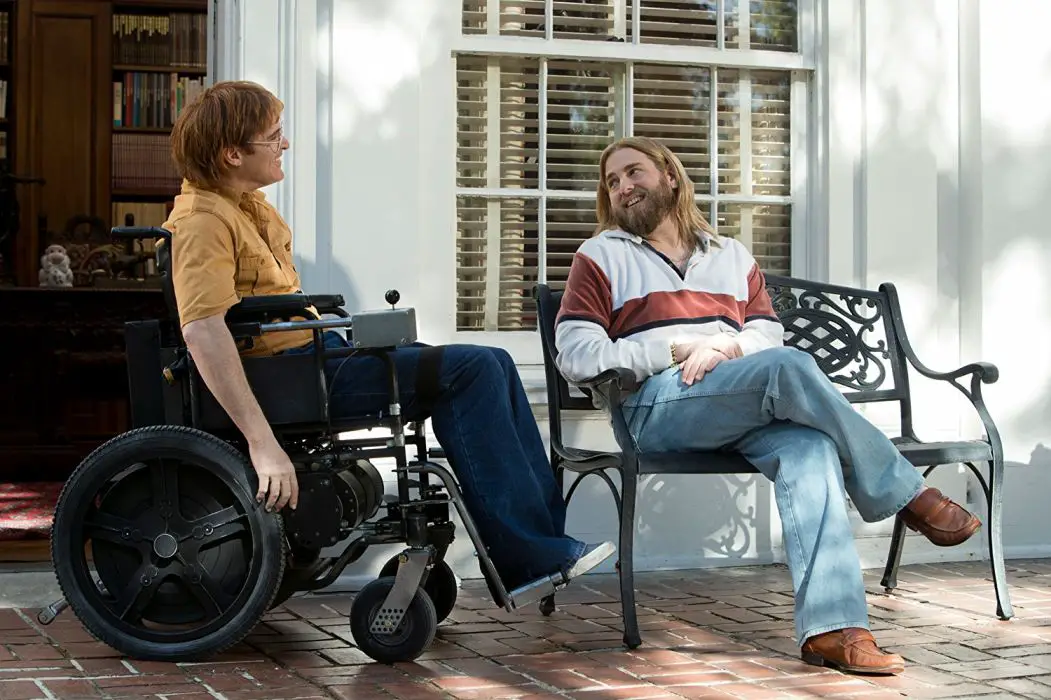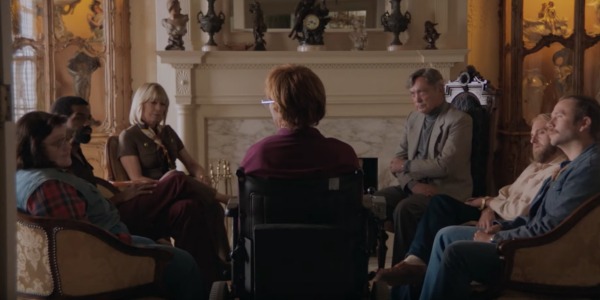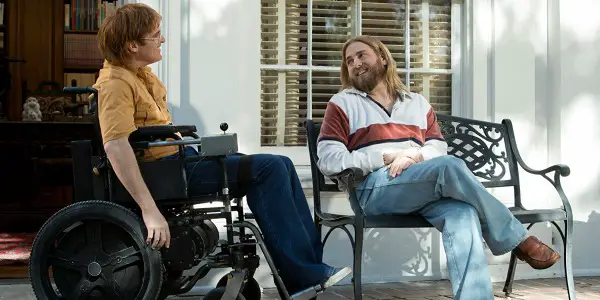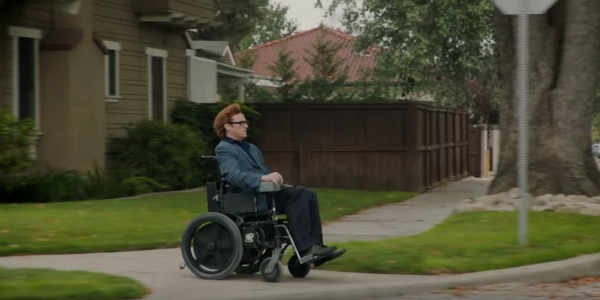SFIFF Review: DON’T WORRY, HE WON’T GET FAR ON FOOT: Van Sant Returns To Portland With Style And Heart

Alex Arabian is a freelance film journalist and filmmaker. His…
The end of the 2018 San Francisco Film Festival (SFIFF) has befallen us. On April 15, director Gus Van Sant screened his latest film Don’t Worry, He Won’t Get Far On Foot at the historic Castro Theater of San Francisco as the closing film of SFIFF. The film debuted at Sundance Film Festival and made its next stop at the Berlinale (Berlin International Film Festival, where it was nominated for a Teddy, or Best Feature Film, and a Golden Berlin Bear, or Best Film). Van Sant and composer and frequent collaborator Danny Elfman were in attendance at SFIFF for a Q&A, during which they spoke at length about the inception of the film and their friendship and working relationship.
Based on his eponymous autobiography, Don’t Worry, He Won’t Get Far On Foot follows alcoholic John Callahan (Joaquin Phoenix in a transformative performance) on the volatile road to recovery. After John gets in a car accident, he is left a quadriplegic with little upper-body feeling save for minimal movement in his arms, hands, and head. Forced to reanalyze his life, John begins attending Alcoholics Anonymous (AA) meetings, where he meets his sponsor, Donnie (Jonah Hill in an Oscar-caliber performance). Donnie and the group teach John the twelve steps and give him a sense of community and family that he never had. In the process, John finds his passion in drawing irreverent newspaper cartoons, eventually becoming famous for his work.
Callahan, Van Sant, Jack Gibson, and William Andrew Eatman provided the story for Don’t Worry, He Won’t Get Far On Foot, and Van Sant wrote the screenplay. Phoenix, Rooney Mara as Annu, John’s girlfriend, and Jack Black give excellent performances, but it is Hill that steals every scene, turning in the best performance of his career.
The Twelve Steps & Forgiveness
John is reluctant to go through the twelve steps at first in his AA group. He’s angry about his life circumstances. He’s a orphan who never knew his parents. He’s bitter about how he was injured. He’s having trouble coming to terms with his disability. He drinks to forget about these things. However, as one of his fellow AA members, Reba (Beth Ditto) explains, if he keeps it up with the “poor me, poor me, poor me” attitude, pretty soon he’s going to start saying “pour me another.” John struggles to relinquish himself to a higher power. Donnie helps him through the steps and eventually advance to the step of forgiveness.

Van Sant makes it a point to take the viewer through every single person on John’s list in Don’t Worry, He Won’t Get Far On Foot. One of the last people on the list John forgives is Dexter (Black), who was driving him heavily inebriated at the time of his accident. This is a particularly touching scene that shows Black‘s dramatic range as an actor. Black and Hill, both known for their comedic roles, give stellar dramatic turns. Hill as Donnie is arguably the most comfortable and free-spirited the actor has ever been in a role; there are equal opportunities for comedic and dramatic moments for Hill. There’s something festering beneath Donnie’s calm exterior, crescendoing slowly towards an eventful third act.
The Preparation & Inclusion
Lastly, Donnie tells John that he needs to forgive himself in order to move forward. Phoenix is impressive in the role of John, nailing Callahan’s mannerisms, humor, and wit. He handled the role gracefully at a time when the conversation around casting disabled actors in disabled roles has picked up. It isn’t an exaggerated performance, it isn’t offensive, rather, it feels genuine. For the most part, aside from Phoenix as John, Van Sant cast disabled people in roles with characters that had disabilities in Don’t Worry, He Won’t Get Far On Foot.

“Well, I think our process was, at first with Joaquin,” Van Sant said when asked how he and Phoenix prepared for the role of John Callahan, “we went to Rancho Los Amigos, which is in Downey, California, which is where John went through his rehabilitation – the original place. And with the help of that facility, we met a lot of the people that had similar disabilities to John Callahan’s disability as a quadriplegic. And some of those characters are in the film; Jesus is his roommate in the hospital. There was an acting teacher [Christopher Thornton] who played Charles-Marie, his friend in the hospital, and he’s a paraplegic. And he was really the only actor that I could find that was so disabled in the way that some other characters were. The other people in the hospital also were coming from the hospital – were cast through the hospital.”
When asked if he would have an inclusion rider for disabled people in the future for his projects by one of the audience members, Van Sant pledged that he would. The role of John Callahan originally was intended Robin Williams, who purchased the rights in 1996. It was during then when Van Sant had the opportunity to meet Callahan and interview him on video. However, after Williams‘ untimely death, Van Sant had to make the project without him and choose another actor.
Don’t Worry, He Won’t Get Far On Foot marks the second time Van Sant and Phoenix have worked together (they first collaborated on To Die For in 1995). Van Sant has also worked with Phoenix‘s late brother, River, in My Own Private Idaho and his sister, Rain, in Even Cowgirls Get the Blues. As such, over the years, Joaquin and Van Sant have developed a close friendship. Speaking of close friendships…
Elfman & Van Sant – A Gifted Friendship
Danny Elfman and Gus Van Sant have collaborated on seven projects including To Die For, Psycho, Good Will Hunting, Milk, Restless, Promised Land, and, now, Don’t Worry, He Won’t Get Far On Foot. Aside from Good Will Hunting, this film may mark their finest collaboration yet. Elfman‘s score is particularly jazzy, matching Callahan’s unpredictability as a person and the intense speed he rides his electric wheelchair at, cutting in front of people on sidewalks, crossing streets with speeding traffic.
It’s a score we haven’t heard from Elfman before, one that is often as improvisational as some of the scenes between Phoenix and Hill. It doesn’t have a consistent time signature, and features sporadic drum lines and brass and wind solos. However, as the film progresses, and John becomes more stable, the score morphs into something a tad more traditional.

It helps that Elfman has a rock background. Former songwriter and frontman of the bands Mystic Knights of the Oingo Boingo and Oingo Boingo, Elfman is able to bring a different layer to a film that other composers don’t usually incorporate in a score. Van Sant, a guitar play himself, will occasionally send his own compositions or playlists of artists he’s listening to during spotting sessions. The two largely conceived of the score of Good Will Hunting by just playing guitar with Elliott Smith in a basement together.
“The initial deal is, I send Danny a screenplay.” Van Sant said when asked about his process of working with Elfman. “Or, we actually sometimes play volleyball together, so I sometimes mention it in the volleyball court. And then I’ll say I’ll send you a script. And then I have to find a version of the script and I send it to him. This is before the film is made, usually. And Danny’s not working on it at this point, he’s just saying, ‘yeah, yeah, let’s just see if the deal gets made.'”
Elfman enjoys the freedom that Van Sant gives him, Especially in the case of Don’t Worry, He Won’t Get Far On Foot.
“With Gus, much more than most directors, I’m gonna try all kinds of stuff,” Elfman said of Van Sant‘s flexibility as a director, “because he likes mix and matching music in more interesting ways than most directors would allow me to do. So I know I’m going to choose a really wide palate for Gus because I’m not going to ever make him go – he’ll never say, ‘what the hell was that?!’ which is something I’ve heard a lot in my life. If anything he’ll say, “well, that’s good, but do you have anything weirder?'”
Conclusion: Don’t Worry, You Won’t Get Disappointed
Van Sant directed Don’t Worry, He Won’t Get Far On Foot almost in the style of a documentary. He often uses quick zooms and pans to great effect, matching the fast-paced antics and inner-workings of Callahan. This is the third film of Van Sant‘s to take place in Portland after Mala Noche in 1986 and Drugstore Cowboy in 1989. Costume designer Danny Glicker, who previously worked with Van Sant on Milk, does a fine job matching the style of clothing in the Pacific Northwest in the 1970s. Cinematographer Christopher Blauvelt filters the film through a dark yellow tint, emulating the sunny but overcast climate of Portland. Together, all of the aspects add to a wonderfully-crafted period piece.
With exceptional performances from Hill, Phoenix, Mara, and Black, an inventive score from Elfman, spasmodically calculated direction by Van Sant, and an incredible true story, Don’t Worry, He Won’t Get Far On Foot succeeds as a biopic.
Are a fan of John Callahan’s cartoons? What’s your favorite Danny Elfman score?
Don’t Worry, He Won’t Get Far On Foot opens theatrically in the U.S. on July 13, 2018. For more information on its release, click here.
Does content like this matter to you?
Become a Member and support film journalism. Unlock access to all of Film Inquiry`s great articles. Join a community of like-minded readers who are passionate about cinema - get access to our private members Network, give back to independent filmmakers, and more.
Alex Arabian is a freelance film journalist and filmmaker. His work has been featured in the San Francisco Examiner, The Playlist, Awards Circuit, and Pop Matters. His favorite film is Edward Scissorhands. Check out more of his work on makingacinephile.com!













